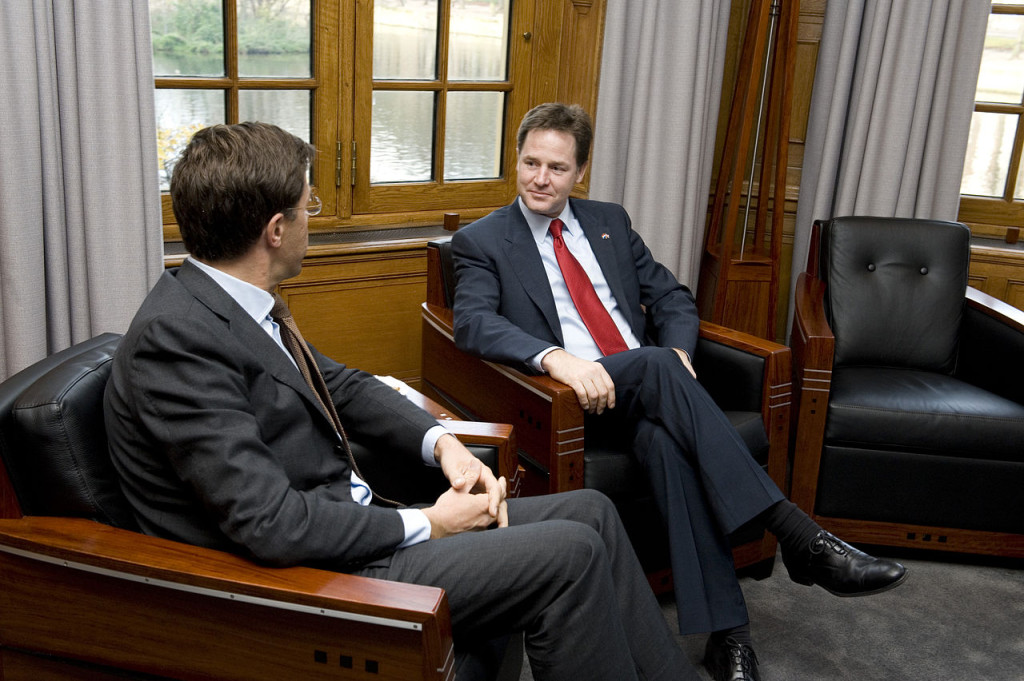Coalition governments which are formed in advance of elections have better survival prospects
The UK has been governed by a Coalition, with relative stability, since the 2010 General Election when a Hung Parliament saw the Conservatives appeal to the Liberal Democrats for their help in forming a majority government. But while the UK has been relatively stable during this period, coalition governments which are formed in advance of the elections tend to be more stable still, at least according to research carried out by Mihail Chiru.

Two men who know plenty about Coalitions: Dutch PM Mark Rutte and Nick Clegg (Credit: Rijksvoorlichtingsdienst via Wikimedia Commons, CC BY 2.0- )
In recent decades, more and more political parties chose to establish pre-electoral coalitions, in advanced and young democracies alike. One particularly remarkable aspect connected with this phenomenon refers to the life cycle of cabinets formed by these coalitions. Drawing on the analysis of the survival patterns of 534 cabinets from 17 Western European and 10 Central and Eastern European countries, this article shows that the governments formed by pre-electoral coalitions are more likely to last longer.
The analyzed data covers a broad period of time: the oldest cabinet in the study was formed in June 1944, while the most recent executive started governing in December 2008. All in all, there were 125 pre-electoral coalitions included in the government in the analyzed period. In Western Europe, 18.1% of all cabinets were based on such a coalition. In this period, no pre-electoral coalition formed the government in Greece, Finland, Luxemburg, Spain or Great Britain. The corresponding proportion of pre-electoral coalition cabinets is almost three times higher in Central and Eastern Europe: 45.1%, all of the ten countries experiencing the situation at least once.
The majority (69) of the pre-electoral coalition-based cabinets included in the study managed to govern alone, without having to distribute ministerial portfolios to other parties. As can be seen from the plotted mean values in Figure 1, the vast majority of these cases (57) were registered in Western Europe.
Why should cabinets formed by pre-electoral coalitions be more stable?
In contrast to coalition cabinets formed after elections, governments based exclusively on pre-electoral coalitions can rely on institutional mechanisms that have already been developed to enforce and supervise the ‘contract’ enforcement between the partners. An example is represented by coalition coordination boards that decide on disputed candidatures at regional or national level and are used afterwards to solve conflicts between members of the component parties arising in local and regional elected or appointed bodies, or at the level of governmental agencies.
Pre-electoral coalition governments might last longer because they cooperate much more intensely in the legislative arena. A form of such cooperation is the majoritarian allocation of legislative offices (e.g. parliamentary committee chairs) among the coalition member parties. Consequently, pre-electoral coalition cabinets have greater control over legislative policies.
Additionally, pre-electoral coalitions might increase governmental durability because in most of these cases partners negotiate and agree well in advance on the major policies that would form the core of the governmental programme. The agreement on policies is extended in some cases even to portfolio allocation. Moreover, cabinets formed by pre-electoral coalitions tend to distribute offices proportionally more often and more extensively than other coalition governments.
The stability of pre-electoral coalition-based cabinets should be more visible with respect to early election terminations. For a pre-electoral coalition cabinet, dissolution and early elections would mean rethinking an entire electoral strategy, and more precisely, taking decisions on whether to keep the old pre-electoral coalition label, and whether and how to reposition the party vis-à-vis the former coalition partners. Such decisions might prove costly, especially because of the uncertainty regarding how former voters of the coalition would perceive the government failure, who is to blame for it and whether the pre-electoral coalition or its component parties separately are worthy of a new mandate. Given these issues, leaders of pre-electoral coalition cabinets are more likely to prefer non-electoral discretionary terminations – that is, replacements instead of early elections. The ‘replacements’ category includes all cabinets ending because of changes in party composition, in the distribution of portfolios or because of reshuffles.
An exception
The opposite, negative expectation can be derived for the durability of cabinets including pre-electoral coalitions formed between the governing parties that had been in power during the term before the election. Such a situation is not uncommon, with many Western (for example, the ‘Purple Coalition’ in the Netherlands) and some Eastern coalitions (for example, Mikulas Dzurinda’s cabinets in Slovakia) asking voters for a mandate to continue their programme and actually receiving it. For these incumbent pre-electoral coalition-based cabinets, the new executive most often carries a legacy of unresolved conflicts and personal frictions that had not exploded in the first mandate. Moreover, later in the term, party leaders might become worried that their brand identities become blurred after so many years of cooperation with the other parties, and thus decide for an abrupt exit.
How strong is the effect?
Using the widely accepted competing risks design I analysed separately the general risk of discretionary cabinet termination, the risk of replacement, and the risk of early elections termination. The survival analysis run on the pooled (WE and CEE) data indicates that pre-electoral coalition cabinets have a 30% smaller probability of terminating discretionary, that is: either through replacements or early elections.
Moreover, Western cabinets based exclusively on pre-electoral coalitions have a much smaller chance of ending through an early election. Thus, their risk of early election termination is 42% smaller than that of other cabinets, all other things being equal. For the Western European cabinets, it could be safely concluded that the positive relationship between pre-electoral coalitions and government durability is not caused by the degree of ideological compatibility between the member parties. The relationship is reversed for the pre-electoral coalitions that had governed in the previous legislative cycle: they exhibit a 60% higher risk of discretionary termination, and are 43% more vulnerable to end with replacements compared with the rest.
These findings have the potential to make pre-electoral coalition cabinets even more attractive for citizens or scholars in search of good governance than it is usually assumed: beyond the increased transparency regarding government formation and the stronger policy mandate received from voters when they manage to win elections, their enhanced stability can ensure more time for designing and implementing crucial policies.
—
This article is based on the paper, ‘Early Marriages Last Longer: Pre-electoral Coalitions and Government Survival in Europe‘, published by Government and Opposition.
Note: this post represents the views of the author and not those of Democratic Audit or the LSE. Please read our comments policy before posting.
—
 Mihail Chiru is a PhD Student at the Central European University in Budapest
Mihail Chiru is a PhD Student at the Central European University in Budapest





 Democratic Audit's core funding is provided by the Joseph Rowntree Charitable Trust. Additional funding is provided by the London School of Economics.
Democratic Audit's core funding is provided by the Joseph Rowntree Charitable Trust. Additional funding is provided by the London School of Economics.
RT @LSEPubAffairs: Coalition governments which are formed in advance of elections have better survival prospects https://t.co/rBvjJeSfv4 htt…
Coalition governments which are formed in advance of elections have better survival prospects https://t.co/9eWJclg9RG @PJDunleavy
Summary of my research on the higher durability of pre-electoral coalition cabinets published on @democraticaudit at https://t.co/Bg2uiDoaI5
Un artículo interesante que podría extrapolarse al debate de las coaliciones “ganemos” para las próximas municipales https://t.co/obuJk8qxIu
Coalition governments which are formed in advance of elections have better survival prospects https://t.co/8mWNkNXrG0
@democraticaudit: Better survival prospects for coalition govt formed pre-election. https://t.co/BXH37hVgBp
But… selection bias?
Coalition governments which are formed in advance of elections have better survival prospects https://t.co/egYjFeQz2s